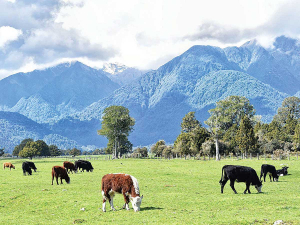Another Windfall for Fonterra Farmers, Unit Holders
Fonterra farmer shareholders and unit holders are in line for another payment in April.
 Fonterra says that pasture-based farming is what has kept the New Zealand dairy industry's footprint low.
Fonterra says that pasture-based farming is what has kept the New Zealand dairy industry's footprint low.
Fonterra says new analysis showing New Zealand dairy farms having the lowest carbon footprint in the world is a result of the country’s unique pasture-based farming.
Fonterra director of on-farm excellence, Charlotte Rutherford, says it also reflects the hard graft of the co-operative’s farmer shareholders.
“Which as an employee of the co-op makes me feel pretty proud,” says Rutherford.
“We’ve seen consumers become increasingly interested in the carbon footprint of their products, and today’s report confirms we’re well placed to meet people’s desire for food that’s kinder to the planet.
“We know more needs to be done to keep improving and we’re up for the challenge.”
Innovation is a key part of the co-op’s strategy and it has multiple partnerships to develop the tools and solutions needed to support farmers, particularly in areas where they face tough challenges, such as reducing methane emissions.
“One of the keys to helping guide farmers to continuously improve is ensuring they understand their emissions profiles,” she says.
“Last year, all our farmers received a greenhouse gas emission report specific to their farms. It’s a very practical step toward helping New Zealand meet climate change commitments.”
But finding a solution requires more than just hard graft from the co-op’s farmers and solutions like Kowbucha, seaweed and feed additives are being investigated for potential breakthroughs in reducing emissions from cows. Fonterra has also teamed up with Nestlé and DairyNZ to expand a promising plantain trial to help improve waterways and reduce on-farm greenhouse gas (GHG) emissions.
The report from AgResearch, commissioned by DairyNZ compares New Zealand with 17 other countries. It confirms our footprint is 70% lower than the global average and 46% lower than the average of other countries in the study, which includes all major milk producers.
The Meat Industry Association of New Zealand (MIA) today announced that Chief Executive Officer Sirma Karapeeva has resigned from the role.
The winners of the 2026 Hawke’s Bay/Wairarapa Dairy Industry Awards were announced at the annual awards dinner held at Copthorne Solway Park in Masterton on Thursday evening.
Environment Southland is welcoming this week’s decision by the Environmental Protection Authority (EPA) to approve the release of Blaptea elguetai, a leaf‑feeding beetle that will help control the highly invasive Chilean flame creeper.
This March, the potato industry is proudly celebrating International Women’s Day on 8 March alongside the International Year of the Woman Farmer, recognising the vital role women play across every part of the sector — from paddocks and packhouses to research, leadership, and innovation.
Fruit trader Seeka posted a record profit and returns to shareholders in 2025.
Recent weather events in the Bay of Plenty, Gisborne/Tairawhiti, and Canterbury have been declared a medium-scale adverse event.
OPINION: Staying with politics, with less than nine months to go before the general elections, there’s confusion in the Labour…
OPINION: Winston Peters' tirade against the free trade deal stitched with India may not be all political posturing by the…